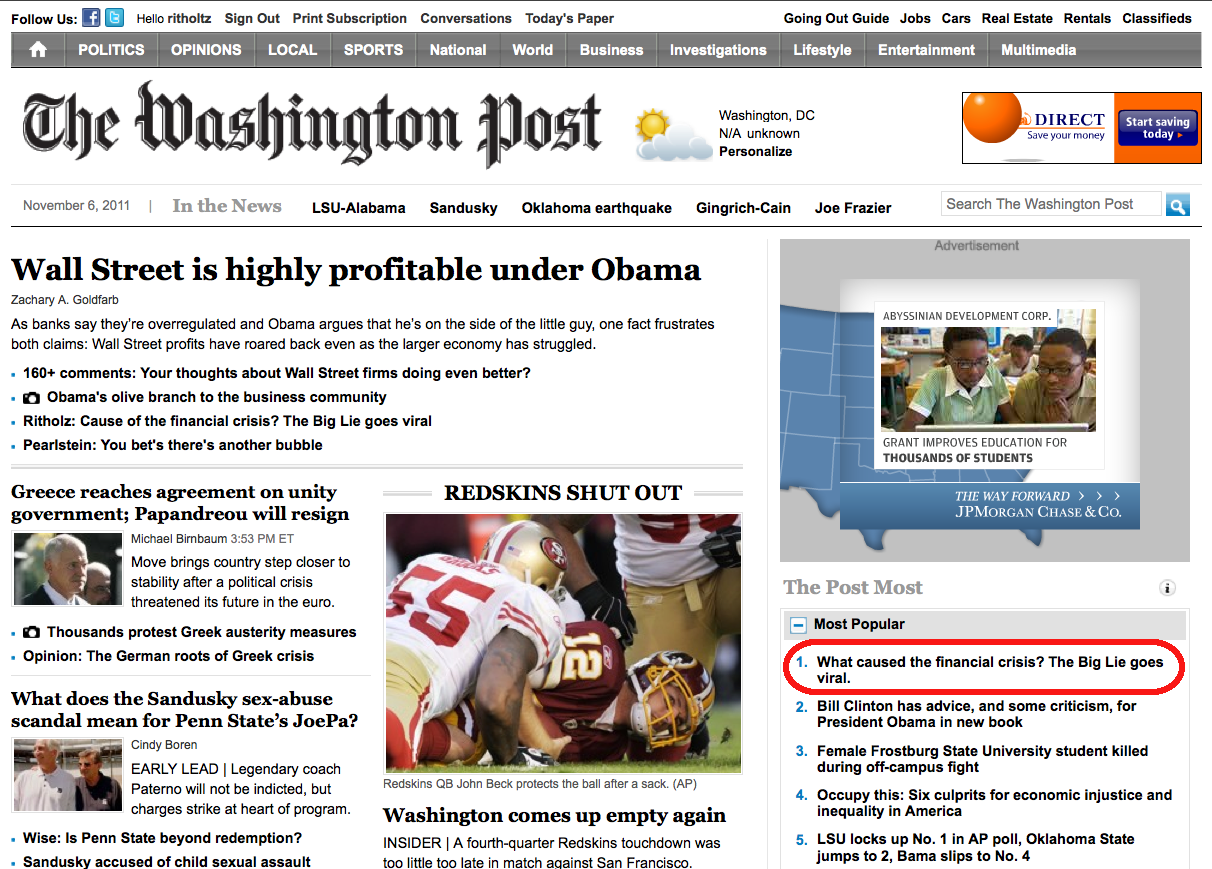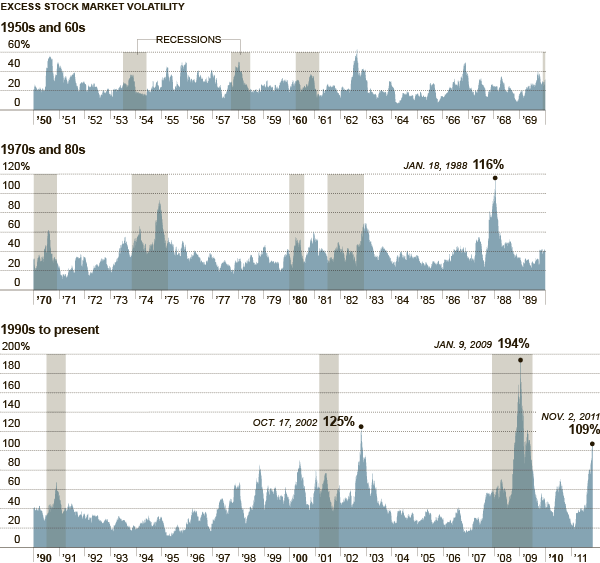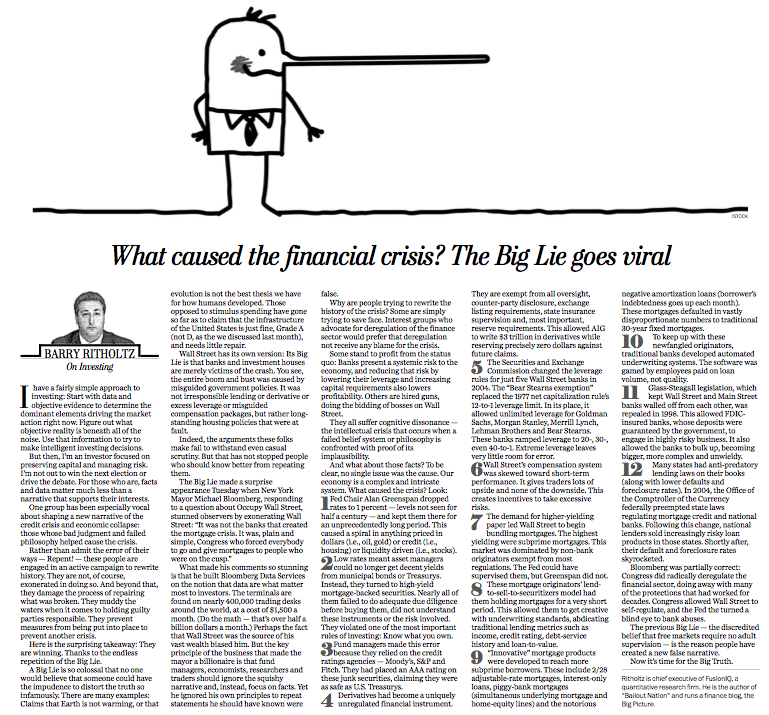The Big Picture | |
- The “Big Lie” is Most Popular Article in Washington Post!
- Jim Goetz: Y Combinator’s Startup School @Stanford
- MF Global & NY Fed—Part 2
- Lots of Volatility, Little in way of Gains
- Dilbert: Job Interview
- The Big Lie of the Financial Crisis
- MF Global, NY Fed, Chutzpah?
| The “Big Lie” is Most Popular Article in Washington Post! Posted: 06 Nov 2011 02:30 PM PST Wow, this is way cool: My Washington Post article, What caused the financial crisis? The Big Lie goes viral. is the single most popular article of the Sunday paper! This morning, it was most popular in the Business section, but it seems to gotten have legs, and traffic migrated from the rest of the Post readers (450 comments, too!). Check it out: > click for full size front page |
| Jim Goetz: Y Combinator’s Startup School @Stanford Posted: 06 Nov 2011 01:30 PM PST
|
| Posted: 06 Nov 2011 11:00 AM PST MF Global & NY Fed—Part 2 Many thanks to readers for their supportive email re yesterday's comments on MF Global and the NY Fed. We have a little follow-up. MF Global. Corzine resigned and has retained "white-collar" counsel. The FBI investigates. There's more to be revealed. Meanwhile we wonder, how did $600 million of clients' assets held at MF get to JPMorgan Chase. And why? This is a puzzle for us. Cumberland Advisors is a boutique firm (26 people) with a few billion in client's assets under surveillance. We try to know where every dollar is every day. Daily reconciliation reveals any discrepancies and resolves them quickly. We do not understand how MF did not know where the assets were and how JPM was not sure. Note that Cumberland has/had no exposure to MF Global (readers asked), and we did not buy their debt, even though it was rated investment-grade. NY Fed. Gretchen Morgenson and Josh Rosner covered the issue of NY Fed audit and supervision in their book, Reckles$ Endangerment: How Outsized Ambition, Greed, and Corruption Led to Economic Armageddon (pp. 42-44). I read this book and recommend it to readers. They mentioned the fact that in January 1992 the Fed ended its primary dealer surveillance program that it had long used to audit and inspect Wall Street firms. From then on, the Fed had to rely on reports filed by the firms, which were verified by other regulators. “It was, to some Fed officials, a dangerous delegation of an important duty that had given the central bank access to crucial information about the soundness of the Wall Street firms it was dealing with,” the authors wrote. Let's flesh out some history. The Fed stopped (1992) this surveillance activity following the bankruptcy of Drexel Burnham, then a primary dealer. The Fed was motivated by the Salomon Brothers episode, according to a document review. The Salomon affair came after Drexel. Let's probe. In his January 13, 2010 letter to the US Senate Banking Committee, Fed Chairman Ben Bernanke cited the Drexel case as an example of the Fed's surveillance used with a positive outcome. Readers note that the NY Fed policy statement on primary dealers that I cited in my previous commentary was published just two days before Bernanke sent this letter. That is the statement in which the NY Fed disclaims supervision and says it relies on the accuracy and transparency of the information the primary dealers report to the NY Fed. Boldface is mine for emphasis. Bernanke wrote: "A similar example emerged in the case of the failure of Drexel Burnham Lambert in February 1990. Drexel's rapid collapse posed a risk of gridlock in the financial markets. Notably, because of their parent's failure, Drexel's solvent broker-dealer and government securities dealer subsidiaries experienced serious difficulties liquidating their positions. Because of its ongoing supervisory relationships with the banks that provided settlement services to Drexel's subsidiaries and its knowledge of the payment and settlement system's infrastructure, the Federal Reserve had the access, contacts, and in-depth knowledge that enabled it to obtain the information it needed to evaluate this complex problem and formulate a plan to address it. The Federal Reserve understood the potential problems of Drexel's counterparties and clearing banks and was able to work with the banks and securities firms to identify developing problems and fashion procedures that enabled an orderly winding down of Drexel without adverse effects on other market participants or further disruption to financial markets." The full text of Bernanke's letter is here: http://www.federalreserve.gov/BoardDocs/RptCongress/supervision/supervision_report.pdf. When you read it you will note the argument for surveillance and supervision. And you will see that it is silent on the behavior about the NY Fed's surveillance or lack of same. We did some digging into the 1992 decision, which was motivated not by Drexel but by the Salomon Brothers episode. Then NY Fed president Jerry Corrigan is quoted in the minutes of the FOMC conference call of January 9, 1992. The minutes were released to the public in 1997, five years after the event. Readers may find the transcript at http://www.federalreserve.gov/monetarypolicy/files/FOMC19920109confcall.pdf. Readers please note that Corrigan is identified as vice-chairman because the president of the NY Fed is the traditional vice-chairman of the Federal Open Market Committee of the Fed, and this is a transcript of an FOMC conference call. Today. NY Fed president Bill Dudley is the vice-chairman of the FOMC. We excerpt from Corrigan (1992). Boldface is mine. VICE CHAIRMAN CORRIGAN. All I can say, Bob, is that the point you raised has been at the heart of this issue since time immemorial. There is only one solution to the problem that I know of and that solution would be that the Federal Reserve should have a full [unintelligible] and regulatory authority, something that the Federal Reserve itself historically has never been crazy about. It is also something that as a practical matter would be extremely difficult to achieve in political terms …" At the November 12, 1997 FOMC meeting, then NY Fed official Peter Fisher stated the following in his report. For the minutes of that meeting see: http://www.federalreserve.gov/monetarypolicy/files/FOMC19971112meeting.pdf. Peter Fisher's report is excerpted below. Boldface is mine. "Criteria for primary dealer relationships with the FRBNY were revised in February 1992 following the Solomon Brothers episode. At that time, we identified “drawbacks” of the then-existing primary dealer system as including: “… the pubic impression that, because of the Federal Reserve Bank’s standards for selecting and maintaining these relationships, the Fed is in effect the regulator of the primary dealer firms [and that] . . . the primary dealer designation has been viewed as conferring a special status on these firms that carries with it elements of “franchise value” for the dealer operation ….” As a consequence, the criteria were revised, dropping the requirement that dealers maintain a one-percent share of total customer activity. At the same time, the FRBNY discontinued its “dealer surveillance” activities. So here is the question for the NY Fed and, by reference, the FOMC. You have the power to write the rules and policies for primary dealers. You cannot do it for the entire system, because you need the Congress to legislate, but you can do it for the primary dealers that transact directly with you. You choose them. You set the terms of admission to this club. You had a surveillance operation and ended it in 1992. The evidence shows that the surveillance function worked prior to that ending decision. Your Board of Governors Chairman noted how successful it was in keeping the Drexel failure from becoming a systemic meltdown. Your Fed Chairman cited the repeated role of the Fed in numerous crises and how the Fed responded to limit systemic damage. So why do you not require compliance with a surveillance team as a condition of primary dealer status? Without the surveillance team, we have witnessed Countrywide, Bear Stearns, Lehman, Merrill, and now MF Global. Would a defined role for a surveillance team have changed things? Maybe. It did with Drexel, when you had the team in place. You admitted MF Global to primary dealer status in February, 2011. Had there been a surveillance requirement, would they have applied? Would you have granted them this status? If yes, would their behavior have been different? Would Lehman's? Would others? The great sage Albert Einstein suggested that repeating something and expecting a different outcome is "insanity." The NY Fed is repeating its reliance on primary dealers to be transparent and accurate and to do so voluntarily. That 1992 policy change has been and is a disaster. The Fed Chairman made the case for surveillance and supervision in his letter to the US Senate. Question for the NY Fed and FOMC: you have the power to change this. What are you waiting for? ~~~ David R. Kotok, Chairman and Chief Investment Officer |
| Lots of Volatility, Little in way of Gains Posted: 06 Nov 2011 10:00 AM PST I have been discussing this over the past few weeks, so I was delighted to see Floyd Norris put it into great context:
What’s ironic (if that’s the right word) is that Norris is discussing short term trading. However, it is just as true for long term investing. What we have seen over the past decade is rising volatility and little in the way of forward progress. This is the nature of secular bear markets. (I have a great chart somewhere I’ll dig up for tomorrow). Here’s the visuals he used in the Times: > > Source: |
| Posted: 06 Nov 2011 08:19 AM PST |
| The Big Lie of the Financial Crisis Posted: 06 Nov 2011 05:30 AM PST > My Sunday Business Washington Post column is out. This morning, we look at The Big Lie and the Financial Crisis. The print and online versions had the same headlines: What caused the financial crisis? The Big Lie goes viral. (You can see the excised bits that did not make it to the final version here). Regardless, here’s an excerpt from the column:
I like the layout and art work in the dead tree version of the paper: > > Source: Washington Post Sunday, November 5, 2011 page G6 (PDF) |
| Posted: 06 Nov 2011 04:30 AM PST MF Global, NY Fed, Chutzpah? ~~~ "The Federal Reserve Bank of New York has terminated MF Global, Inc's status as a primary dealer." –October 31, 2011, NY Fed press release For the details involving primary dealers and a list of those firms that are currently members of this select club, see the New York Fed website. This link: http://www.newyorkfed.org/markets/primarydealers.html and a few minutes of reading will tell the story. Among the rules and policies of the New York Fed primary dealers you will find the following sentence. "The Bank (NY Fed) expects primary dealers to submit accurate data, but the Bank itself does not audit the data" (boldface is mine). Readers may note that regulatory oversight of primary dealers is not conducted by the NY Fed. This is so even AFTER Dodd-Frank. The policies regarding primary dealers were updated on January 11, 2010. Here is the link: http://www.newyorkfed.org/markets/pridealers_policies.html. January 2010 is AFTER a primary dealer named Countrywide failed and was merged with a primary dealer named Bank of America, which was enticed to do the deal with a rule change promulgated by the Fed. January 2010 is AFTER a primary dealer named Bear Stearns was merged with another primary dealer named JP Morgan Chase, whom the Fed assisted by taking assets under "Maiden Lane LLC." January 2010 is AFTER a primary dealer named Merrill Lynch was merged with the primary dealer named Bank of America. And January 2010 is AFTER a primary dealer named Lehman Brothers failed and triggered the financial meltdown we know as the Great Recession, for which we are still paying a price. Readers may note that the NY Fed also published the criteria for admission to this select club of primary dealers. Take a look at them. Then ask yourself if the policy of selection, transaction, and reporting of primary dealers is consistent with the Fed disclaimer you will read below and in the rules. Is this a sound policy? Or is it chutzpah? The citation is from the NY Fed website. The boldface portion is my doing, for emphasis. "The New York Fed continues to emphasize that the nature of its relationship with primary dealers is a counterparty relationship, not a regulatory one. This policy establishes the framework by which the New York Fed will prudently manage its counterparty risk consistent with its mandates to implement monetary policy and promote financial stability. The New York Fed also recognizes the value of maintaining transparency in its administration of its relationships with the primary dealers. In light of the foregoing, third parties are reminded that the designation of an entity as a primary dealer by the New York Fed in no way constitutes a public endorsement of that entity by the New York Fed, nor should such designation be viewed as a replacement for prudent counterparty risk management and due diligence."
Is this not chutzpah? Let me engage in a quick digression so I am not accused of being anti-semantic. New York City is a wonderful place to visit. It is also the global bastion of innovative financial chutzpah. For those unfamiliar with the word chutzpah, please note it is a Yiddish term meaning boldness and self-confidence, temerity, or lack of respect. Example of financial chutzpah: a lawyer takes a taxi to the MF Global bankruptcy hearing. The cabby says "That will be $37.50. The lawyer says "Come inside and join the unsecured creditors." That's chutzpah. The MF Global affair is doubly muddied up by alleged fraud and misuse of client funds. We cannot blame the NY Fed for an alleged fraud. But we can ask if the sanction for a primary dealer that fails the "transparency" and the "accuracy" tests should be limited to getting kicked out of the club. Maybe the $150 million minimum regulatory net capital requirement should be expanded, and maybe the shareholders and debt holders of a primary dealer should be told they are subordinated to claims that will include financial penalties for failure to comply with NY Fed rules. Maybe the NY Fed should take on an escrow safety-cushioning function in the same way a landlord holds a security deposit for a tenant. Maybe this whole system of New York Fed actions and primary dealer status needs reexamination. Maybe the system needs a chutzpah scan to remove the viruses. Was the MF Global risk taking apparent? Many say no. But there are some very smart and skilled folks who say otherwise. One of them is Janet Tavakoli. Janet nailed it. For readers who are not familiar with Janet, see her website: www.tavakolistructuredfinance.com. Here is an excerpt from a note that Janet wrote on November 3. We are fortunate enough to see her superb and timely work. We talked with Janet on Friday. She walked us through the evidence that was missed by many. Janet, you are awesome! Janet wrote: "The fact that MF Global was exposed to default risk and liquidity risk because of these trades and that they were linked to European sovereign debt was disclosed in MF Global's 10K for the year ending March 31, 2011, a required financial statement filed with the SEC. The CFTC and other regulators had the information right under their noses, but it appears they didn't understand that they were looking at a leveraged credit-derivative transaction that could lead to margin calls that MF Global would be unable to meet." Thank you, Janet. Let's segue to some questions. More will be revealed on the fraud allegations; nothing for us to add there. But one question haunts us. Will the opacity of the New York Fed and the accountability for its oversight or lack of oversight be made transparent? Has anything really changed since the six-month period between the Bear Stearns merger (March 2008) and the Lehman failure (September 2008)? If the New York Fed was "watching the store," did they miss the clues for lack of skill, or were they deceived by MF Global? Is the disclaimer of the NY Fed financial chutzpah to the Nth degree? Inquiring minds want to know. So should all the others who have to live with the results of the failure of the primary dealer named Lehman Brothers, whose CEO sat on the board of directors of the NY Fed until his firm failed. And so do the creditors of MF Global. One corrective note. In my interview with Bloomberg's Tom Keene (October 31, www.bloomberg.com), I misspoke. I said that MF Global was not a primary dealer. Live television is unforgiving, and so let me clarify. What I was trying to do is distinguish between two primary dealer failures. The first was Lehman's failure and the aftermath that followed. The second is the present MF Global failure. I argued that the latter is a one-off event and is not a systemic threat like Lehman turned out to be. That was during the Monday interview and discussion with Tom Keene and Stephanie Ruhle. On Friday, I had some quality phone time with Janet Tavakoli. She alerted me to some details that were new information for me. I'm less sanguine about systemic risk now than I was on Monday. Thank you, Janet. And also a sincere thank you to Rick Lang, a friend, fellow GIC member, and retired Fed official who noted my comments on Tom Keene's show. Rick inspired me to clarify them; hence, today's missive strays from our usual market-outlook commentary. ~~~ David R. Kotok, Chairman and Chief Investment Officer |
| You are subscribed to email updates from The Big Picture To stop receiving these emails, you may unsubscribe now. | Email delivery powered by Google |
| Google Inc., 20 West Kinzie, Chicago IL USA 60610 | |




